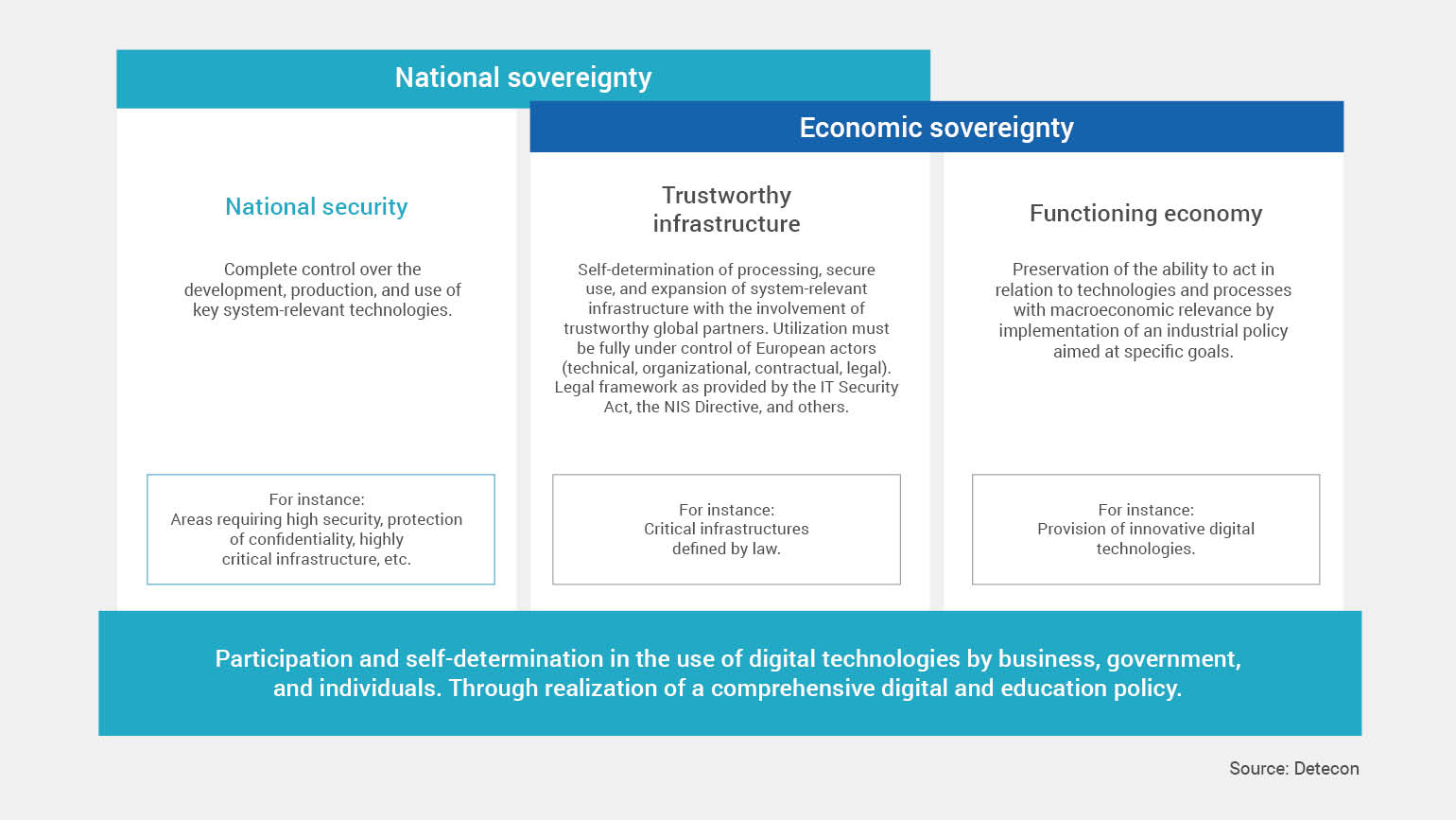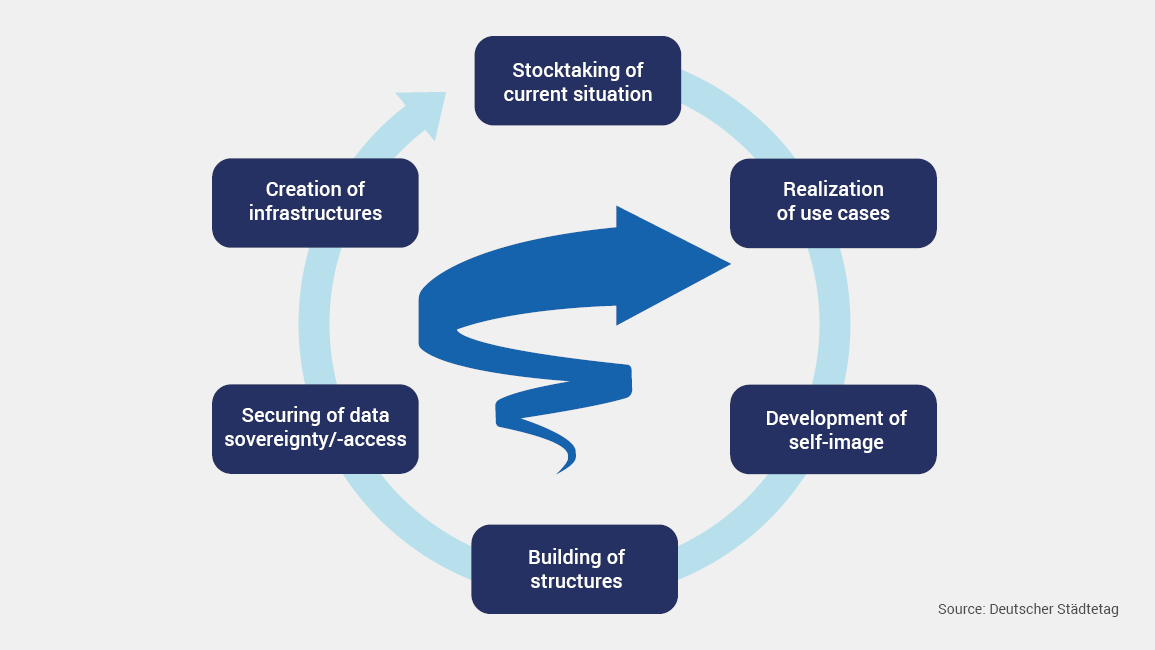The practical realization of digitalization projects in municipalities poses a number of challenges, especially when one speaks of the demands of digital ethics and digital sovereignty in the processing of data. Smart city players must walk a thin line between using data to generate added value for society and simultaneously safeguarding the privacy and data protection rights of individuals.
For a number of years now, the subject of organizations’ responsibility to society has been a constant in any discussions about digitalization. Above all, the question of what is to be done with the huge amounts of data generated by digitization looms large.
Data: both a curse and a blessing in the smart city, too
These data are loved and feared in equal measure. On the one hand, the collection of data gives rise to new business models that offer added value for many. On the other hand, there is the danger that the analysis of these data will result in transparent users who are (or can be) manipulated without their awareness. Ensuring digital sovereignty for organizations and individuals cannot be guaranteed without a discussion of ethical principles that must be observed during digitalization in the interests of all.
What is meant by digital ethics and digital sovereignty?
Digital ethics pose questions about appropriate and acceptable uses of big data and the moral limits of digitalization. The underlying concept is that the relationship between humans and machines is determined not only by the limits of technology, but also by the constraints of morality. (https://www.egovernment-computing.de/was-ist-digitale-ethik-a-871759/)
Digital sovereignty is a crucial prerequisite for the capability of countries, organizations, and individuals to act independently (Digital Summit, 2018). As presently defined by Bitkom (Bitkom, 2019), digital sovereignty is understood to include industrial policy aspects and security policy issues, but extends as well to challenges of consumer policy and legal questions for individuals such as the application of current data protection regulations. (Figure Bitkom: Three-layer Model)

Current questions of digital ethics
The use of digital technologies gives rise to a multitude of questions for digital ethics. One of the most frequently discussed examples relating to the use of digital technologies with a view to safety and acceptance is the dilemma of the decisions made by autonomous cars when an accident is imminent. What actions should the vehicle take if personal injury is unavoidable? Should, for instance, an autonomous vehicle endanger the lives of its passengers in a risky evasive maneuver to avoid a collision with pedestrians? Does it make any difference whether the pedestrians are children, pregnant women, or homeless people? (smc, 2018). In this case, not only is the outcome of the situation evaluated in terms of digital ethics; the use of the data describing the profile of the individuals in the situation is also included.
Another example of a conflict in digital ethics is the automated selection of applicants by an algorithm that may unintentionally discriminate as the systems are usually based on older, pre-existing job profiles on the assumption that past hires have been good choices with the consequence that the system disregards diversity in terms of sex, age, ethnicity, education, and social background. Typical questions that arise for digital ethics:
- How much responsibility may be surrendered to algorithms?
- What tasks should/could/may artificial intelligence assume?
Issues in the smart city
Digital tools are one step towards the realization of a smart city. The benefits of these tools are already familiar from the private sector, but their utilization at the federal, state, and local levels has been on hold for many years. From the moment the concept of smart cities first appeared, politicians, administrators, and operational managers have been facing challenges. But it was not until restrictions to contain the coronavirus pandemic were imposed and the need for data and technology that could provide real-time information became urgent that awareness of these demands became truly acute. Challenges include:
- Security of data
- Protection of privacy
- Assurance of inclusion
- Fast data exchange among authorities and organizations
Questions of digital ethics and sovereignty will be a future concern for cities and regions. Digital technologies play the decisive role for the smart city as they are the source of efficiency gains and improvements in the quality of life. Yet they also turn the smart city into a data machine. In other words, “big data” feature potential for optimization and implementation of completely new ideas, but at the same time the generation of data should be limited to a minimum.
This conflict becomes starkly clear with respect to smart city security concepts: the fact that digital solutions function solely on the basis of the collection of human-related data simply cannot be ignored. To what extent is this permissible?
Costs also play a role. Designers are therefore often tempted to orient their concepts for a smart city to existing digital solutions developed by other cities rather than seeking the “best fit” solutions for their specific cities. The situation is similar with regard to energy consumption; when speaking of sustainability, a smart city always aspires to implement low-energy concepts. Yet digitalization itself consumes more and more energy.
Even the attractiveness of cities with state-of-the-art digital infrastructure harbors an inherent conflict: if a smart city draws more and more people to the city, infrastructures and living space become overloaded and increasingly congested while the populations of rural regions are steadily depleted.
Examples of data use in (international) smart cities
Data analytics — the analysis of mass data — is employed to make cities more livable. The assumption is that conclusions useful for the evaluation of living conditions and quality of life can be drawn from these analyses. The municipal administration as well as other actors can benefit from the results.
The role of digital ethics as relevant for smart cities can be made clearer by the use of examples. The city of Melbourne is a positive example of data use. Data about pedestrian traffic are collected and processed for an analysis of economic behavior that reveals how people move around the city. This in turn serves as the starting point for a proposal for buildings that include restaurants or stores. From the standpoint of digital ethics, this analysis is unproblematic as the data are anonymized and do not permit any conclusions about age, sex, etc., to be drawn.
Another example of the unobjectionable processing of data can be found in Cologne. Data from construction site markings (warning cones) are used to relay the current status of the construction site. These data are forwarded to third parties (emergency vehicles, for instance) and can be used for traffic route optimization.
The city of Singapore provides a negative example. City police were granted access to data from an app to expedite contact tracing during the pandemic. These data, however, were also used for other purposes such as combatting terrorism, murders, and drug trafficking. This is problematic primarily because patterns created during the analysis incriminate individuals without regard for their actual guilt.
Methodological approaches to digital ethics
Cities have a responsibility to their citizens and must always have the aspiration to behave ethically with regard to digitalization, and that means above all enhancing sovereignty for themselves and for the societies within their borders.
Two approaches to these issues that we consider relevant have emerged: the “Policy Road Map G20 Global Smart City Alliance” and the “Cycle for the Strategic Processing of Data”.
The “G20 Global Smart Cities Alliance” was established in response to the call of the G20 ministers to support cities in identifying and developing basic strategies for smart city technologies. This alliance, whose members come from around the world, is committed to creating a policy road map that serves as the foundation for sound technology governance for policymakers and technology providers. The G20 Global Smart Cities Alliance is guided by these five basic principles:
- Fairness, inclusion, and social impact
- Security and resilience
- Data protection and transparency
- Openness and interoperability
- Operational and financial sustainability
The “Cycle of Strategic Processing of Data” developed by Deutsche Städtetag bears this name because technologies are constantly and dynamically evolving. New solutions for the digital city appear unceasingly on the market. These technologies must be the subject of constant discussion and review in terms of digital ethics and sovereignty, including the exploration of new options for data use, of new aspects of a self-image, and of the demands on the data infrastructure. This mutual condition of ongoing developments can be represented in a cycle:

Outlook
There are plenty of ideas and possibilities open to discussion. We have only just begun, however, to gain on-site experience in the municipalities. Much will evolve in the coming years. If the key elements for sovereign and sustainable digitalization are taken into account now, the conflicts from data collection and use described above can be reduced to a minimum for the benefit and progress of all.
We would like to thank our alumnus Simon Nicolas Fröhlich for writing this article.







